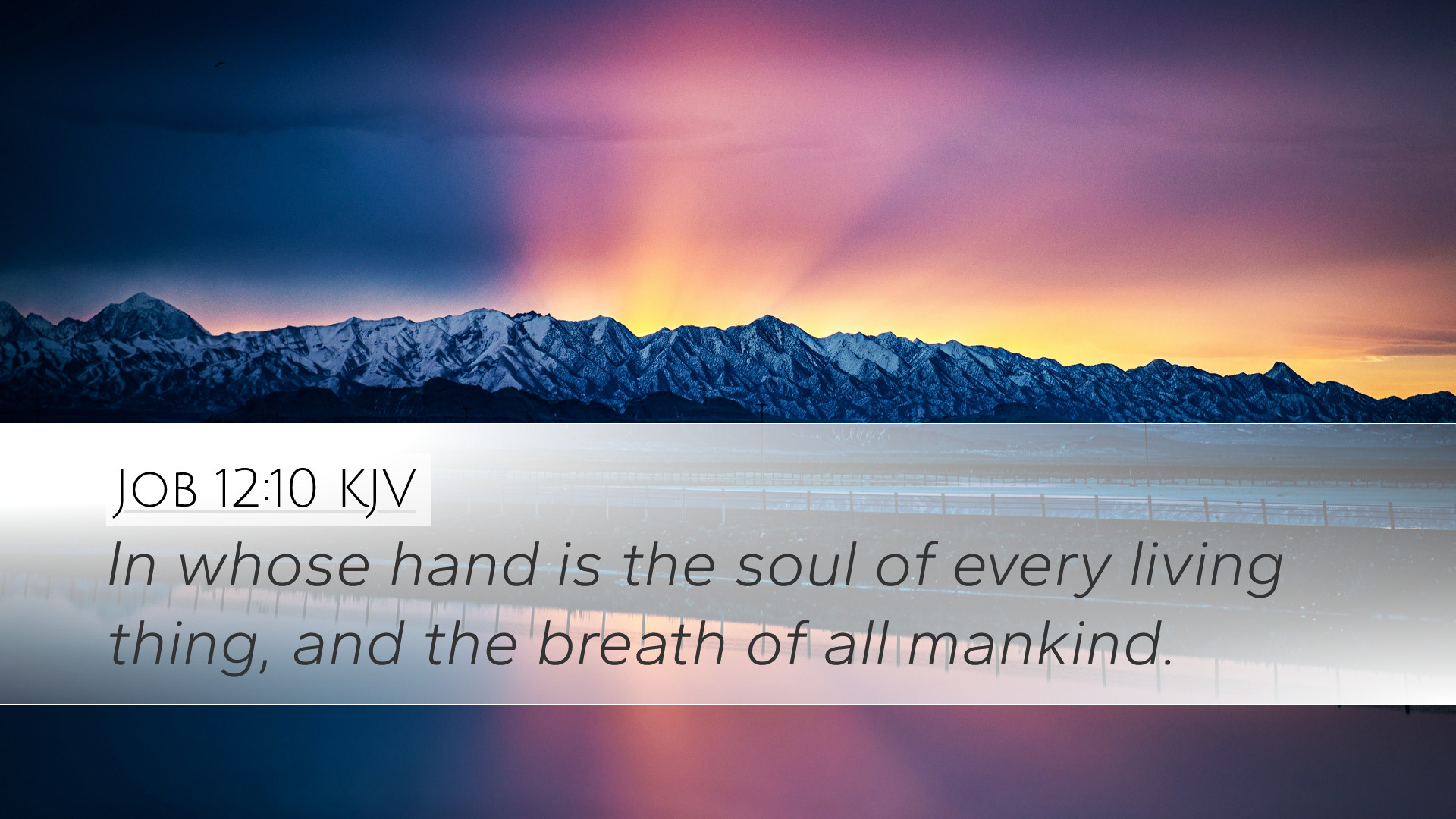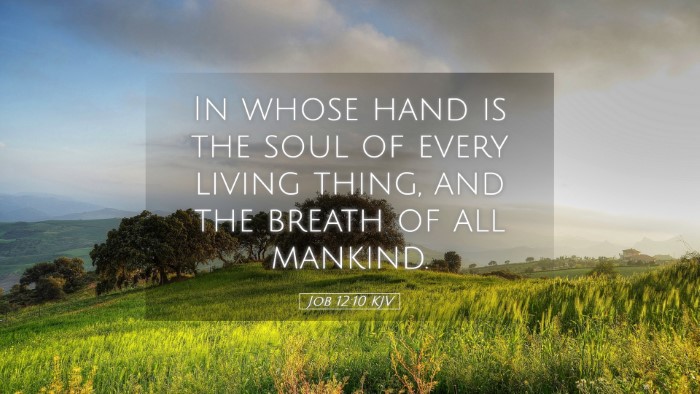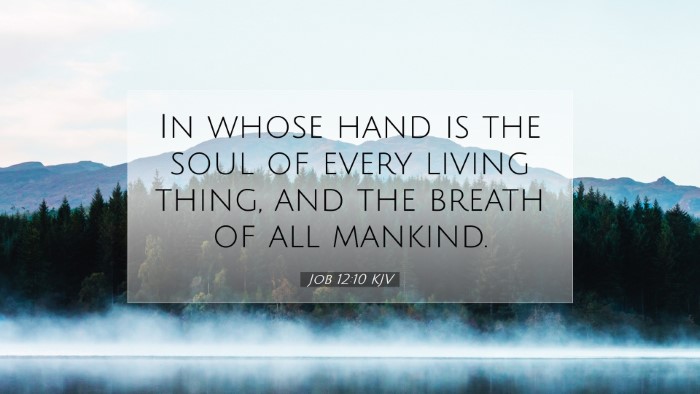Old Testament
Genesis Exodus Leviticus Numbers Deuteronomy Joshua Judges Ruth 1 Samuel 2 Samuel 1 Kings 2 Kings 1 Chronicles 2 Chronicles Ezra Nehemiah Esther Job Psalms Proverbs Ecclesiastes Song of Solomon Isaiah Jeremiah Lamentations Ezekiel Daniel Hosea Joel Amos Obadiah Jonah Micah Nahum Habakkuk Zephaniah Haggai Zechariah MalachiJob 12:10
Job 12:10 KJV
In whose hand is the soul of every living thing, and the breath of all mankind.
Job 12:10 Bible Commentary
Commentary on Job 12:10
Job 12:10 states, "In his hand is the life of every living thing and the breath of all mankind." This verse encapsulates profound theological themes regarding God’s sovereignty, the fragility of life, and the interdependence of creation. Here, we will draw insights from several esteemed public domain commentaries, including those of Matthew Henry, Albert Barnes, and Adam Clarke.
The Sovereignty of God
According to Matthew Henry, this verse powerfully affirms God's ultimate authority over all living beings. He asserts that God "is the fountain of life," emphasizing that all forms of life originate from Him and are sustained by His will. This aspect of divine sovereignty underscores the reality that life is not merely a product of chance but is intricately planned and governed by God.
Albert Barnes expands on this idea by noting that the phrase "in His hand" signifies both possession and control. He notes that God's hand symbolizes power, authority, and protection, thus affirming that the entire cosmos thrives under the governance of its Creator. Barnes further posits that this verse suggests a divine order where every living thing serves a purpose within God’s overarching plan.
The Fragility of Life
In addressing the fragility of life, Adam Clarke comments on the vulnerability inherent in all living things. He reflects on the importance of recognizing our dependence on God for our existence. Clarke points out that aside from God’s sustaining role, life is fleeting and impermanent. This realization motivates an attitude of humility and reverence toward God, as the giver and sustainer of life.
The Breath of All Mankind
The phrase "the breath of all mankind" indicates a unified dependency among humanity—both the righteous and the wicked alike breathe the air that God provides. Henry asserts that this serves as a reminder of our equality before God, as all share in the same divine provision of life. This further amplifies the need for human humility, as no one can boast of their existence apart from God's mercy and grace.
Theological Implications
The theological implications of Job 12:10 are significant for pastors, theologians, and laypeople alike:
- God’s Providence: The verse reflects the providence of God in creation, emphasizing that His governance extends to every aspect of life. Awareness of this can inspire trust and reliance on God’s plans.
- Human Responsibility: Acknowledging God's authority over life imposes a responsibility on humanity to live in accordance with His will, recognizing that our lives are not our own.
- Unity of Creation: Recognizing that the breath of life is bestowed upon all of creation fosters a sense of connectedness, encouraging compassion and stewardship for the environment and all living beings.
Exegesis and Reflection
From an exegetical perspective, Job 12:10 places Job in a position of wisdom amidst his suffering, illustrating a profound understanding of the divine nature. In contrast to his friends’ faulty conclusions about suffering and retribution, Job’s assertion of God’s control over life elevates his discourse. This invites readers to reflect on their own understanding of God in the midst of life’s trials.
Furthermore, Job's acknowledgment of God's hand in life should lead us to introspection about our own lives. As Barnes notes, acknowledging God's sovereignty can transform how we interact with life’s challenges. Rather than succumbing to despair, recognizing that God is ultimately in control encourages believers to maintain faith amidst adversity.
Application in Ministry
In practical application, pastors can leverage the truths found in Job 12:10 to address issues of suffering, confusion, and despair among their congregations. By reiterating the biblical truth that life and breath are gifts from God, they can encourage believers to cultivate a spirit of gratitude and reliance on God's providence even in tribulation.
Matthew Henry humorously yet poignantly suggests that those who are aware of God’s control over life should find strength in His power, leading to a life marked by grace and humility. This biblical perspective on life prompts a call to worship and a deepened sense of faith, as believers recognize that God cherishes every living being He has created.
Conclusion
Job 12:10 is a profound declaration of God’s sovereignty and the divine origin of life. Through the reflection of Henry, Barnes, and Clarke, we understand that acknowledging God’s control invites us to a deeper faith, a sense of unity with creation, and an awareness of our responsibilities toward one another. As we immerse ourselves in the wisdom of Scripture, may we embrace the truth that our very existence is held in the hand of our Almighty God.


